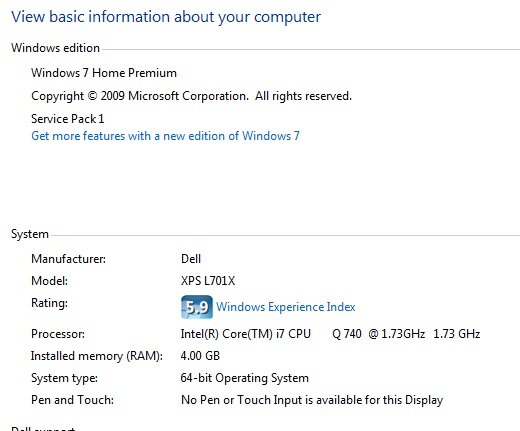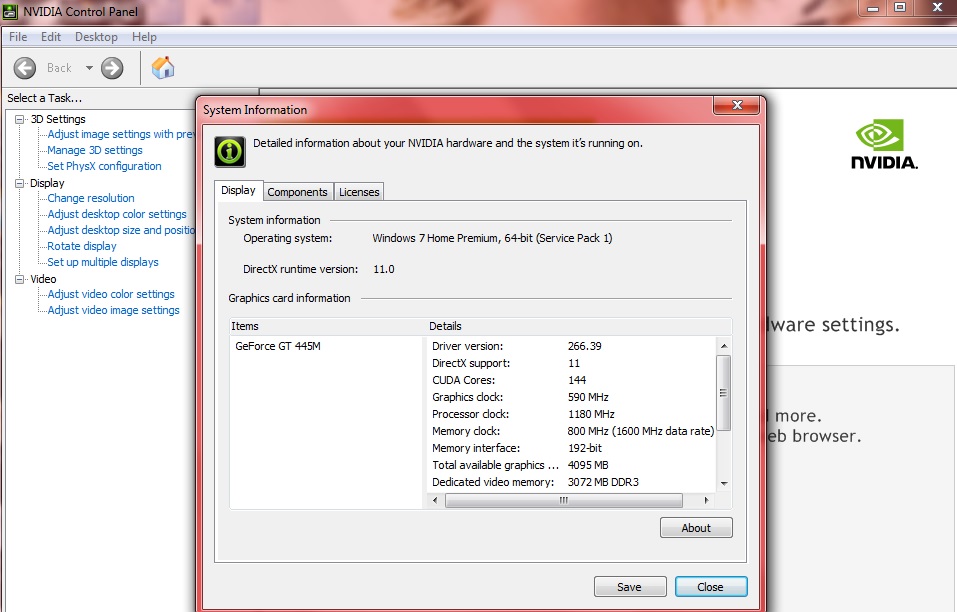Advice on Improving PC Performance?
I do all my gaming on an old laptop that's getting on in years. It was pretty good when I bought it and could play Shogun 2 Total War at near-max settings with no problems until armies get really large with more than two players, at which point lag becomes an issue.
Aside from Total War, and there wasn't really any other performance-demanding games that I am into, and so I don't really want to buy a new computer at a time when finances are rather stretched as it is. So I'd like to get a bit more performance out of my laptop if possible, and would appreciate some advice on how to do so.
My main game for the last 9 months has been Baldur's Gate, which runs beautifully of course, as it is not very demanding at all. However, I do record Let's Plays sometimes, and running a game, Fraps and Audacity at the same time seems to tax the computer considerably, and leads to lag quite regularly.
It was a problem when I recorded BG 2 Vanilla, but it seems to be an even bigger problem with BG:EE, presumably because of increased fps, which results in much larger Fraps files. These larger Fraps files are also more work to compress, and take considerably longer than they used to with BG 2 Vanilla.
I feel like the computer is generally more sluggish than it once was, although I cannot find any viruses or malware with Avast. Can anyone suggest another means of cleaning the system? I have 88 processes running in the background, and I am not sure if all of them are legitimate, and I'm not IT-savvy enough to know which ones I can tamper with.
I have also known for a long time that my laptop has a problem with overheating. On occasion it has crashed, presumably because of it, but whenever I do anything very demanding, parts of the laptop gets pretty hot. I have wondered if a cooling mat would help with performance? Something like this...
http://www.amazon.co.uk/Targus-Lap-Chill-Mat-17-inch/dp/B002Q8X3L2/ref=sr_1_1/277-9125856-4735863
Anyways some details about my laptop:


Aside from Total War, and there wasn't really any other performance-demanding games that I am into, and so I don't really want to buy a new computer at a time when finances are rather stretched as it is. So I'd like to get a bit more performance out of my laptop if possible, and would appreciate some advice on how to do so.
My main game for the last 9 months has been Baldur's Gate, which runs beautifully of course, as it is not very demanding at all. However, I do record Let's Plays sometimes, and running a game, Fraps and Audacity at the same time seems to tax the computer considerably, and leads to lag quite regularly.
It was a problem when I recorded BG 2 Vanilla, but it seems to be an even bigger problem with BG:EE, presumably because of increased fps, which results in much larger Fraps files. These larger Fraps files are also more work to compress, and take considerably longer than they used to with BG 2 Vanilla.
I feel like the computer is generally more sluggish than it once was, although I cannot find any viruses or malware with Avast. Can anyone suggest another means of cleaning the system? I have 88 processes running in the background, and I am not sure if all of them are legitimate, and I'm not IT-savvy enough to know which ones I can tamper with.
I have also known for a long time that my laptop has a problem with overheating. On occasion it has crashed, presumably because of it, but whenever I do anything very demanding, parts of the laptop gets pretty hot. I have wondered if a cooling mat would help with performance? Something like this...
http://www.amazon.co.uk/Targus-Lap-Chill-Mat-17-inch/dp/B002Q8X3L2/ref=sr_1_1/277-9125856-4735863
Anyways some details about my laptop:


0


Comments
My computer has this same problem too, that's why I haven't made a let's power-re-play BG:EE.
EDIT: not power-play, power-re-play :P
That's really good advice! I never heard of that before, but it looks like it would make a real difference. However... my laptop is around 3 years old, I wonder if it is worth upgrading. It seems pretty expensive... I mean 256GB upgrade kit is £150... my laptop has over 900 GBs... I dread to think how much that would cost to replace, if it was even possible.
Unless the HDD is unable to keep up with writing the captured video and audio, but I don't really know what would happen then. You could maybe check if this the case by viewing disk usage under the Performance tab of the task manager.
Slightly more drastic, but often effective, is backing up your music, saves, work etc and reformatting your hard disk. This will get rid of any unnecessary processes as well and freeing up space. Before you do it make sure you have backed up everything you need and that you have a Windows disc to reinstall from.
Laptops are a pain in terms of ageing though. They're a bugger to upgrade or replace components of. Good luck.
As for aging, computers don't have any mechanical parts (except HDDs), so they don't really wear with age. Under extreme circumstances semiconductor components do experience degradation, but that shouldn't happen with consumer electronics. For example, I'm still on a first-gen Intel i7 from 2008 and it's still good as new.
EDIT: To clarify, under extreme circumstances you get RAPID degradation. The components do degrade nevertheless, but at a rate that is insignificant (in ten years everything is already beyond obsolete).
My best advice is to proceed with a solid problem determination before attempting to trigger anything.
A ssd usually helps but it may have a minor effect if you have no real I/O issues.
For someone playing with video and sound editing softwares, a 4GB amount of memory seems rather weak. This is the first thing I would monitor.
As regards the laptop heat, it is easy to understand it keeps you warm. You have two watt-hungry components in your machine : the cpu (a cpu generation which is clearly not ideal for laptops) and a discrete graphic chip. There is not much to do about that, except if you think the internal mechanical parts / air flow circuits are dusty.
And then I do some regular manual swipes with SUPERantiSpyware (which I only turn on and update when I search the computer). That can be a good idea to do despite avast.
Also, you can google your processes to determine if they are legitimate/useful or not. Also, although an SSD is great, new hard drives are generally very fast - getting your OS installed on an SSD might be benefical though. What I am more concerned with is the cost of upgrading the hard-drive in a laptop (which might become very expensive). If you want to buy a new computer you might also want to consider a good old-fashioned desktop, I just bough one fairly cheap but good enough specs for me and easy to upgrade if I feel the need.
@Musigny and @TJ_Hooker
I did a Disk Cleanup, which liberated about 6GBs of space, and Disk Defragmentation, which took ages! It seems to have improved things a little bit.
I also discovered that I have at least one malware on my laptop, Yontoo Desktop, which is stubbornly difficult to remove.
Anyway here's some more details for my PC performance, I can't pretent to understand a whole lot...
I took those screenshots whilst running video compression. It would seem that when my laptop struggles, the limiting factor is CPU, which oscillates from 70% to 100%. Memory is a bit more stable, and seems to peak around 70%. That said, I've noticed that for reasons I do not understand, compression can take either ~300KBs of memory or ~700KBs. When it is the latter, the process becomes very slow.
A high cpu usage is not bad per se. After all this is good to have cpu-hungry applications actually using the hardware you bought.
A simple metrics/correlation to detect a cpu bottleneck is to look at both the cpu % load and the processor queue length. To do that you have to learn how to use the performance monitor (not the nice looking resource monitor). If the queue shows a substantial increase when the cpu saturates then there is a real bottleneck (or alternatively the queue is too big and the scheduler does not grant enough time to the processes requiring it).
Something is weird though. You seem to have a high cpu usage but your cpu frequency remains underclocked (blue line on the first graph if I am correct); Are all of your logical cpus (cpu 0, 1 etc) close to 100% ?
You should verify your power options to make sure there is nothing wrong with your power manager (windows or dell provided).
Next : your laptop memory.
There is a suspicion of BG1 iron memory shortage. Nothing certain though.
Let me explain : your computational memory is at least 78 % as indicated by the fake "used physical memory" percentage. This is a lot even for a pc/workstation.
It is too difficult to make a conclusion based on a single static (and partial) screenshot. Let me check the right MSwindows naming of the metrics I have in mind and I will let you know (perfmon again).
Something you can do is to take a screenshot of the Disk tab too.
We can have a look at the response time and the queue length (digression : hey Microsoft what about a simple Fword-ing-nonPG13 I/O per sec metric here).
Call for help : does anyone know a MS windows command line equivalent to iostat ?
One last point, could you try to test your performance and capture the same graphs 1) without using Chrome and 2) with no Windows Update previously activated (this might be a "security essentials" update too) : reason bieng that Chrome and TrustedInstaller have a substantial memory footprint on your system screenshot.
Old times like win98 it was good to remove temporal folder but nowdays os didnt work.
If you run msconfig and look at the startup tab, this will show you exactly what is being run. Anything you don't need to run at startup can be switched off and should help speed up your PC.